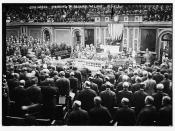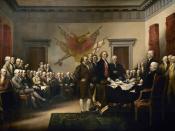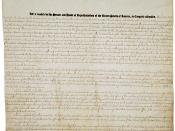Matthew Helm
A Presidential Look:
John Adams - The Only Federalist President
John Adams was the second president of the United States of America. Over his term as president, Adams had to deal with many conflicts centered on the political climate, the economy, and foreign and domestic affairs.
During the presidential campaign of 1796, Adams was the presidential candidate of the Federalist Party with Thomas Pinckney as the second most popular Federalist. Their opponents were former Secretary of State Thomas Jefferson and Senator Aaron Burr on the Democratic-Republican ticket. Although most Federalists would have preferred Alexander Hamilton to be a candidate, they supported Adams all the same. In the end, Adams won and became President and Jefferson became Vice President. It was the first and only election to elect a President and Vice President from opposing tickets. The presence of a Democratic-Republican so high up in the Adams administration made it difficult at times for the president to promote his Federalist agenda and was the beginning of many conflicts.
In an era of peace, a president with Adams' view of the office might have enjoyed a tranquil four years. However, from the start, the presidency of John Adams was dominated not by tranquility, but by a single issue that threatened to destroy the Union before the end of its first decade. It was fortunate for the nation, and for Adams' claim to presidential great-ness, that this single issue concerned foreign policy, the area in which the president had the most independent authority and the one for which Adams was best prepared for by experience. This issue was France.
In 1796, Paris ended all diplomatic relations with the United States in response to Jay's Treaty of the previous year. Having expected the United States to uphold the Franco-American alliance of 1778,


